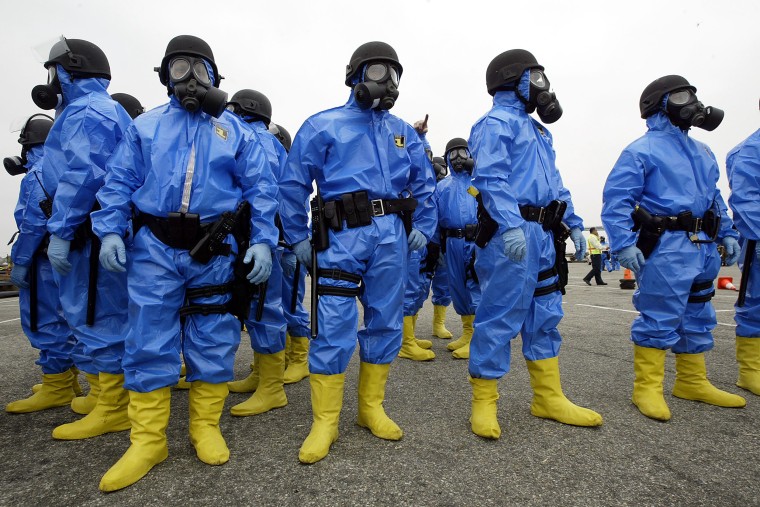American and Ukrainian alarm over a sudden flurry of Russian claims that Kyiv is planning to deploy a so-called dirty bomb have worsened fears that President Vladimir Putin could try to escalate the conflict to try to change the course of the war.
Ukraine and its allies vehemently reject the Russian accusations, countering that, in fact, the Kremlin may be planning a “false flag” operation in which it blames Kyiv for its own actions.
As tensions over the nine-month-old war worsen, NBC News looks at what a dirty bomb actually is, the damage it can cause and whether it can render any military advantage.
What is a dirty bomb?
A dirty bomb, also known as a “radiological dispersion device,” is defined as a conventional weapon that has been augmented with a radioactive material. Traditionally, security experts have warned of dirty bombs being used by terror groups instead of militaries.
The method of delivery could be a missile, an airplane stocked with radioactive materials or a strategically planted improvised explosive device, according to the Washington-based Center for Arms Control and Non-Proliferation.
It’s a basic, rudimentary device that’s easy enough to make with explosives and radioactive material, Tom Plant, a nuclear expert and senior associate fellow at the Royal United Services Institute, a defense and security think tank in London, told NBC News.
A variety of radioactive materials could be used, he said, including ones used in nuclear medicine and for industrial purposes. When deployed, the material does not do anything to make the explosion any bigger, he said, but is purely there to create contamination, and most likely panic.
What damage can it cause?
Just how devastating a dirty bomb can be depends on the type and size of the conventional explosives used, as well as the potency and amount of radioactive material that has been added to it.

The main danger from a “dirty bomb” comes from the explosion, not the radiation, according to the guidance on radiological dispersion devices from the Centers for Disease Control and Prevention.
“Only people who are very close to the blast site would be exposed to enough radiation to cause immediate serious illness,” according to the guidance. “Still, radioactive dust and smoke can spread farther away and could be dangerous to health if people breathe in the dust, eat contaminated food or drink contaminated water.”
Pavel Podvig, a senior researcher at the United Nations Institute for Disarmament Research, said in a tweet that a “dirty bomb” contamination area is likely to span no more than a few hundred yards in diameter.
“To create serious contamination over a large area one would have to blow up a nuclear reactor, Chernobyl-type,” Podvig said.
The psychological damage from deploying a dirty bomb in Ukraine would probably be far-reaching, according to Plant.
“The fact that it’s dirty — in that the contamination spreads around — is the kind of thing that people get scared of,” he said.
It could also overwhelm hospitals as people rush to get assessed for radioactive poisoning after the deployment even if they are not sick, and could cause widespread disruption as authorities undertake a potentially extensive clean-up, Plant added.
Why are we talking about a dirty bomb now?
Claims by the Kremlin that Ukraine plans to use a dirty bomb as a provocation to blame Russia for the resulting radioactive contamination came as defense chief Sergei Shoigu said that Ukraine was trending toward “a further, uncontrolled escalation.”
The United States and Kyiv’s other Western allies have unanimously rejected the claims as “transparently false” and said they were a possible way for Russia to lay the groundwork for an escalation of its own as its military struggles to make progress on the battlefield. The State Department said Monday, however, that it still had no indication that Russia was preparing to use nuclear weapons or a dirty bomb.
On Tuesday, Russia doubled down on its claims that Ukraine is preparing to use a dirty bomb on its own territory and was expected to press the issue at the U.N. Security Council.
Who has the capabilities?
The Russain defense minstry said Monday that Kyiv has the “scientific, technical and industrial potential” to create a dirty bomb.
Russia’s defense ministry said Monday there are nuclear industry enterprises in Ukraine that have stocks of radioactive substances, and two organizations have already received “specific instructions” to create the weapon. The ministry did not provide any evidence, and NBC News could not verify those claims.
Kyiv has steadfastly denied it’s working to create a dirty bomb or deploy one, and has called for international monitors to confirm that.
Plant said both nations have the ability to create a “dirty bomb,” as does any country in possession of explosive and radioactive materials.
But an actual nuclear weapon would be a much bigger technical challenge, one that the “Ukrainians haven’t ever investigated and have no capability to do” Plant said, adding that “the Russians obviously have lots of nuclear weapons already,”
Russia has nearly 6,000 nuclear warheads, according to the Stockholm International Peace Research Institute. Ukraine, long part of the Soviet Union and before that the Russian empire, agreed to give up its nuclear arsenal after it became independent in exchange for security guarantees from Moscow and the West.
Would it give either side an advantage?
A dirty bomb attack has never been recorded, and if it’s deployed in Ukraine, it would likely strike terror into those people immediately affected. Militarily, however, it’s unlikely to give either side much of an advantage, experts said.
“If somebody for some reason uses a ‘dirty bomb,’ it will not change anything militarily, politically or otherwise,” Podvig, with the United Nations Institute for Disarmament Research, said in another tweet.
Given its relatively limited destructive power, the contamination a dirty bomb could cause is not likely to deny the enemy much of territory or make it hard to move through any given area, according to Plant.
“It just wouldn’t have the same area denial potential as, say, chemical weapons or a nuclear weapon or anything like that,” he added.
“It’s completely the kind of thing that would just scare civilians.”
Source: | This article originally belongs to Nbcnews.com










